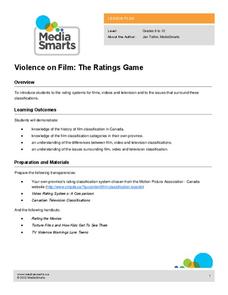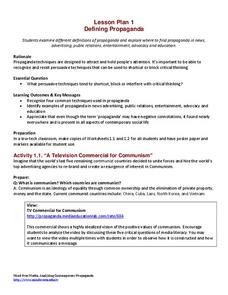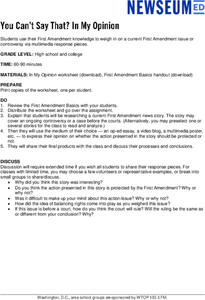Media Smarts
Facing TV Violence: Consequences and Media Violence
Make your class aware of the difference between media violence and real violence. Using prior knowledge, a video clip, and a worksheet, class members explore and discuss the unrealistic portrayal of violence in the media. Learners...
Curated OER
Tobacco: Promotion Tactics and the Law
Youths aged 13 & 14 are most likely to notice and remember in-store tobacco promotions. Class members dissect tobacco advertising tactics and learn about relevant legislation by participating in guided discussion. Assessing...
Media Smarts
Tobacco Labels
Adolescents compare and assess the efficacy of tobacco product health warning labels from around the world. In groups, they invent warnings and create labels that would be effective for teens and children. Discussion covers advertising...
Media Smarts
Violence on Film: The Ratings Game
Learn about film and TV ratings systems in Canada (includes a comparison to the MPAA system) and how they influence appropriate viewing for youths. A detailed commentary about the film Seven pointed at revealing flaws in ratings systems...
Sharp School
Career Project 2
Help your pupils find some direction with a career research project. Individuals research three careers, using the included graphic organizers to record their findings. They then create a visual aid on a computer and present their...
Education Bureau of Hong Kong
Mental Models
Critical to responsible decision making is becoming aware pre-conceived notions and biases that influence our perceptions. A colorful slide presentations asks viewers to consider these mental models that factor into their assumptions and...
Crabtree Publishing
Why Does Media Literacy Matter?
Criticism of news and entertainment journalism is at an all-time high. Help 21st-century learners develop the media literacy skills they need to become critical consumers with a three-lesson guide the looks at persuasive techniques used...
Tean Truth
Who Do You Admire and Why?
A five-question worksheet asks learners to consider who they admire, the qualities this person has that they admire, and why they find these characteristics admirable. To conclude, pupils select three of the qualities they admire in...
WE Charity
Exploring the Four Leadership Styles
What is your leadership style? Tweens and teens independently complete a Four Leadership Styles worksheet. Once completed, they use a leadership code to identify their prominent leadership style. Class members gather by style, brainstorm...
Newseum
Disinformation Nation: Separating Politics and Propaganda
Separating political rhetoric from propaganda is no small feat. Class members are challenged to examine two different sources about a candidate in an upcoming election and determine whether the primary purpose of the source is to inform...
Media Education Lab
Defining Propaganda
21st century learners live in a media world. Help them develop the skills they need to be able to analyze the barrage of propaganda they face daily, with a resource that introduces them to the type of persuasive appeals found in news,...
Nemours KidsHealth
Online Safety: Grades 9-12
Teach teens how to protect themselves from hackers, scammers, and online predators. First, class members examine their own digital footprints think critically about their online profile. Groups then generate lists of "do" and "don't do"...
Nemours KidsHealth
Online Safety: Grades 6-8
Recognize risky behaviors and avoid them! That's the big idea behind two activities designed to teach middle schoolers to think critically about online safety. After reading background articles about protecting online identity,...
K20 LEARN
Street Cred: Evaluating Sources
A lesson on evaluating sources of information teaches scholars to "think twice" before using a source. Researchers examine a resource's home page, author, and sponsor, as well as the date published and the documentation provided.
Nemours KidsHealth
Screen Time: Grades 6-8
How much screen time is too much screen time? Even before COVID, tweens were spending hours watching TV, playing video games, and connecting with their friends by smartphone and computers. Two activities from Kids Health get young...
Newseum
You Can’t Say That: In My Opinion
As a part of a study of the First Amendment, high schoolers research a current news story that seems to involve one of the freedoms granted by the First Amendment. Investigators decide whether they think the action presented in the story...
Curated OER
Scientific Detectives
Students examine the legitimacy of advertisers' claims about products using science and critical thinking. They view and discuss ads, read a case study, and conduct an experiment to demonstrate whether a product lives up to its claims.
Media Smarts
Media Awareness Network: Hate or Debate?
Discuss the difference between legitimate debate on a political issue and arguments that are based on hate through a science-fiction scenario that shows how a controversial issue can be discussed in both ways. Then learn how purveyors of...
Curated OER
The Student Cafateria as the "Leafy Chestnut Tree"
Students examine the difference between "news" of earlier periods, and "news" as we know it today. They then go out into the school common areas and analyze news from the perspective of word-of-mouth storys and discuss what they can...
Weebly
Mini-Media Literacy Project
Encourage your pupils to think critically about media and the messages media portrays. Starting off with a quick-write about pop culture, this assignment launches into a hands-on, collaborative collage project. After creating collages,...
Media Smarts
Gender Messages in Alcohol Advertising
Make your students critical consumers of media, and foster an awareness of how culture is reflected and shaped by media. This resource covers how alcohol advertising presents and promotes gender stereotypes. After a discussion on...
Newseum
When Tragedy Hits — Role-Playing a Breaking News Story
Young journalists engage in a role-playing exercise that asks them to consider the journalism and ethical issues raised by the coverage of the mass shootings at Virginia Tech on April 16, 2007. Pupils play the role of either a reporter...
Newseum
Is This Story Share-Worthy?
Young journalists use a "Is This Story Share-Worthy?" flowchart graphic to decide whether a story is worth sharing online. Instructors provide groups with fake news, poor quality stories, opinion pieces, biased news, and high-quality...
Curated OER
American Imperialism
Critical analysis skills can be built in a variety of ways. Using editorial cartoons (both domestic and foreign) learners will consider how American Imperialism was perceived during the late 19th century. Critical thinking questions,...

























